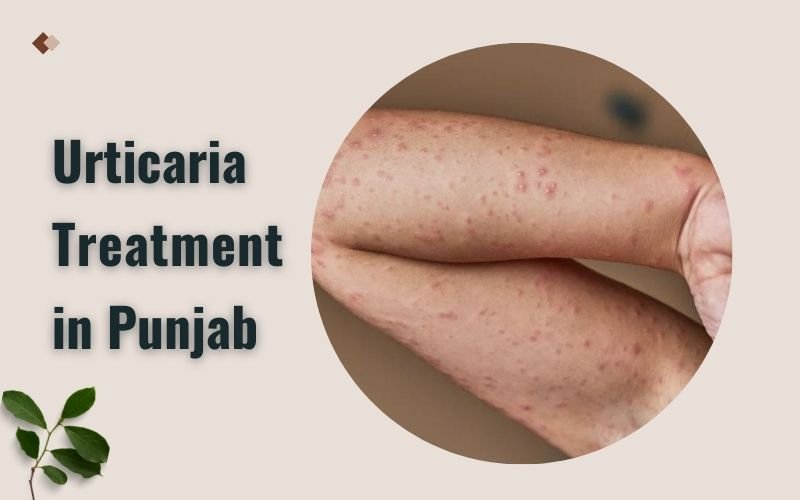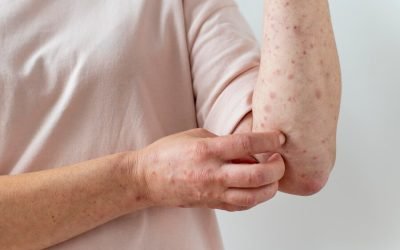Top Hives (Urticaria) Treatment in Punjab: Expert Care and Effective Solutions

book your appointment

Understanding Urticaria
Urticaria, commonly referred to as hives, is a skin condition characterized by the sudden appearance of red, itchy welts or bumps on the skin. These welts can vary in size from small spots to large patches and may merge to form extensive areas of swelling. Urticaria can affect any part of the body and is often accompanied by a burning or stinging sensation. It is generally categorized as either acute or chronic, based on the duration of the symptoms. For those seeking Urticaria Treatment in Punjab, various effective options are available to manage and alleviate this condition.
Common Causes of Urticaria (Hives)
Urticaria can be triggered by a variety of factors, including:
- Allergic Reactions: Foods (such as nuts, shellfish, eggs), medications (like antibiotics and NSAIDs), insect stings or bites, and exposure to certain animals or plants.
- Physical Triggers: Pressure on the skin, temperature changes (cold or heat), sunlight, exercise, and water (aquagenic urticaria).
- Health Conditions: Infections (viral, bacterial, or fungal), autoimmune disorders, hormonal changes, and underlying chronic diseases such as thyroid disease or lupus.
- Emotional Stress: Stress and anxiety can exacerbate symptoms, leading to outbreaks or worsening of existing hives.
Symptoms and Signs of Urticaria

The primary symptom of urticaria is the development of red or skin-colored welts that:
- Can vary in size from a few millimeters to several centimeters.
- Often appear suddenly and change shape, disappear, and reappear within minutes or hours.
- Are typically itchy and may cause a stinging or burning sensation.
- May be accompanied by swelling of the lips, eyelids, or other parts of the body (angioedema).
- Can last from a few hours to several days, with chronic urticaria persisting for six weeks or longer.
Types of Urticaria
Acute Urticaria
Acute urticaria lasts less than six weeks and is often triggered by:
- Allergic reactions to foods, medications, or insect stings.
- Infections such as the common cold, hepatitis, or mononucleosis.
- Physical factors like pressure or temperature changes.
- Acute urticaria typically resolves once the triggering factor is removed or treated.
Chronic Urticaria
Chronic urticaria persists for more than six weeks and can be particularly challenging to manage. The exact cause is often unknown, but it may be linked to:
- Autoimmune disorders where the body’s immune system attacks its own tissues.
- Chronic infections or underlying medical conditions.
Prolonged exposure to allergens or stress.
Patients with chronic urticaria often require ongoing management and may need to see a specialist to identify potential underlying causes and develop an effective treatment plan.
Physical Urticaria
Physical urticaria is triggered by specific physical stimuli, including:
- Dermatographism: Hives appear where the skin is scratched or rubbed.
- Cold Urticaria: Exposure to cold air, water, or objects.
- Solar Urticaria: Exposure to sunlight.
- Cholinergic Urticaria: Triggered by exercise, hot showers, or stress.
- Pressure Urticaria: Caused by prolonged pressure on the skin, such as from tight clothing or sitting for extended periods.
Understanding the type of physical trigger can help in managing and preventing outbreaks.
Diagnosis of Urticaria (Hives)

Clinical Examination
A clinical examination involves a detailed assessment by a dermatologist to:
- Review the patient’s medical history and symptom patterns.
- Identify potential triggers and exclude other skin conditions.
- Observe the physical characteristics of the hives and any associated swelling (angioedema).
Allergy Testing
Allergy tests help pinpoint specific allergens that may be causing the urticaria. Common tests include:
- Skin Prick Test: Small amounts of suspected allergens are introduced to the skin to observe for reactions.
- Blood Tests: Measure levels of specific antibodies (IgE) that indicate allergic reactions.
- Blood Tests and Other Diagnostic Tools Additional diagnostic tests may be conducted to rule out underlying conditions and include:
- Complete Blood Count (CBC): To check for signs of infection or inflammation.
- Thyroid Function Tests: To identify thyroid disorders linked to chronic urticaria.
- Autoimmune Screening: To detect autoimmune diseases.
- Skin Biopsy: In rare cases, a small sample of skin is taken for detailed examination to exclude other dermatological conditions.
Lifestyle and Home Remedies for Hives Treatment

Dietary Changes
Eliminating or reducing intake of foods known to trigger urticaria can help manage symptoms. Common food triggers include nuts, shellfish, dairy products, and additives like artificial colors and preservatives.
Avoiding Triggers
Identifying and avoiding known triggers is crucial for preventing urticaria outbreaks. This may involve:
- Keeping a diary to track and identify potential triggers.
- Avoiding known allergens or irritants.
- Making environmental adjustments to reduce exposure to triggers.
Stress Management Techniques
Stress can exacerbate urticaria, so incorporating stress management techniques can be beneficial. These include:
- Yoga and Meditation: To promote relaxation and reduce stress.
- Deep Breathing Exercises: To help calm the mind and body.
- Regular Exercise: To improve overall well-being and reduce stress levels.
- Adequate Sleep: To ensure the body is well-rested and better equipped to handle stress.
Why Choose Dr. Parwaaz Matharoo for Urticaria Treatment in Punjab
Expertise and Experience
Dr. Parwaaz Matharoo is a highly skilled dermatologist with extensive experience in treating urticaria and other skin conditions. His deep understanding of dermatological diseases ensures that patients receive accurate diagnoses and effective treatment plans tailored to their individual needs.
State-of-the-Art Facilities
Dr. Matharoo’s clinic is equipped with the latest diagnostic and treatment technologies, providing patients with access to advanced therapies and comprehensive care. This includes allergy testing, immunotherapy, and biologic treatments.
Comprehensive Care Approach
Dr. Matharoo adopts a holistic approach to patient care, considering all aspects of a patient’s health and lifestyle. This ensures that treatment plans are not only effective but also sustainable in the long term. Patients receive personalized care and support throughout their treatment journey, from initial diagnosis to follow-up care.
Preventive Measures and Self-Care
Managing urticaria involves more than just medical treatments. Dr. Matharoo emphasizes the importance of preventive measures and self-care practices, such as:
- Avoiding Known Triggers: Identifying and avoiding allergens and irritants that trigger hives.
- Stress Management: Incorporating stress-reducing techniques like yoga, meditation, and deep-breathing exercises.
- Skin Care Routine: Using gentle, fragrance-free skin care products to prevent irritation.
- Healthy Diet: Maintaining a balanced diet rich in anti-inflammatory foods to support overall skin health.

Book an Appointment with Dr. Parwaaz Matharoo
If you are struggling with urticaria and seeking urticaria treatment in Punjab, Dr. Parwaaz Matharoo at The House of Skin in Ludhiana is here to help. With his extensive experience and personalized approach, Dr. Matharoo offers effective treatment options to manage and alleviate your symptoms. Don’t let urticaria disrupt your life any longer. Book an appointment today and take the first step towards healthier, itch-free skin.
Contact Us
For any questions or to learn more about our services, please don’t hesitate to get in touch with us. Dr. Parwaaz Matharoo and the team at The House of Skin are committed to providing you with the highest level of care and support.
- Address: Kiran Hospital, Gill Rd, Opp. Janta Nagar Chowk, Dasmesh Nagar, Ludhiana, Punjab 141003
- Phone: [+91 82735 00120]
- Email: [pmatharoo14@gmail.com]
- Website: [https://thehouseofskin.in/]
We look forward to helping you achieve clear, healthy skin and improving your quality of life. Reach out to us today and let us assist you on your journey to wellness.
FAQs about Urticaria Treatment
The first step is a thorough evaluation by Dr. Matharoo to identify potential triggers and underlying causes. This often involves allergy testing and reviewing your medical history.
While there is no definitive cure for urticaria, effective treatment can significantly reduce symptoms and improve quality of life. Chronic cases may require ongoing management.
Common side effects include drowsiness (with antihistamines) and increased risk of infections (with immunosuppressants). Dr. Matharoo will discuss potential side effects and monitor your response to treatment.
Avoiding known triggers, managing stress, and following a healthy lifestyle can help prevent flare-ups. Dr. Matharoo will provide personalized recommendations based on your specific triggers.
If you experience frequent or severe hives, difficulty breathing, or swelling of the throat, seek immediate medical attention. For persistent or chronic symptoms, consult Dr. Matharoo for a comprehensive evaluation and treatment plan.
Get Consultation With Our Experts
Schedule a consultation today and embark on a journey towards informed decision-making and success. Your challenges, our expertise – let’s collaborate for a brighter future.

